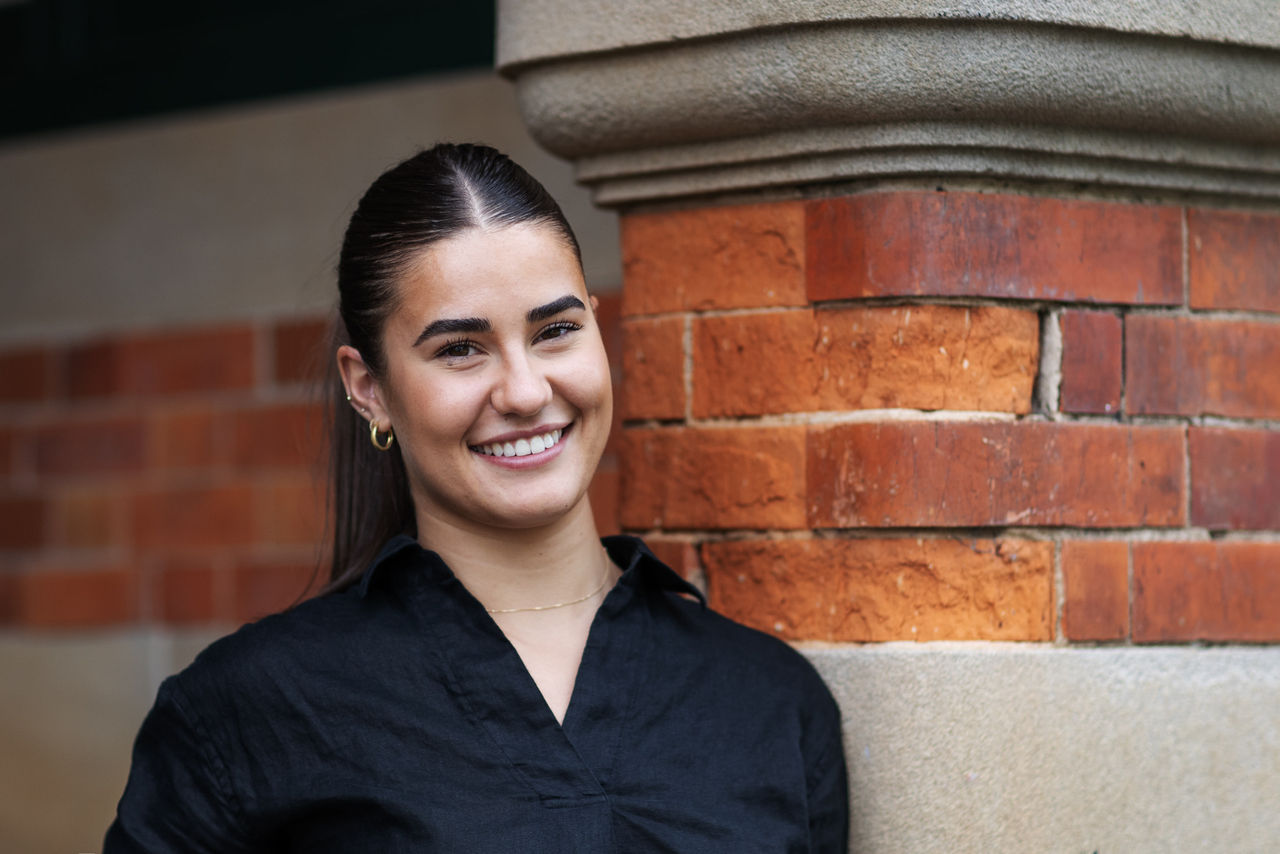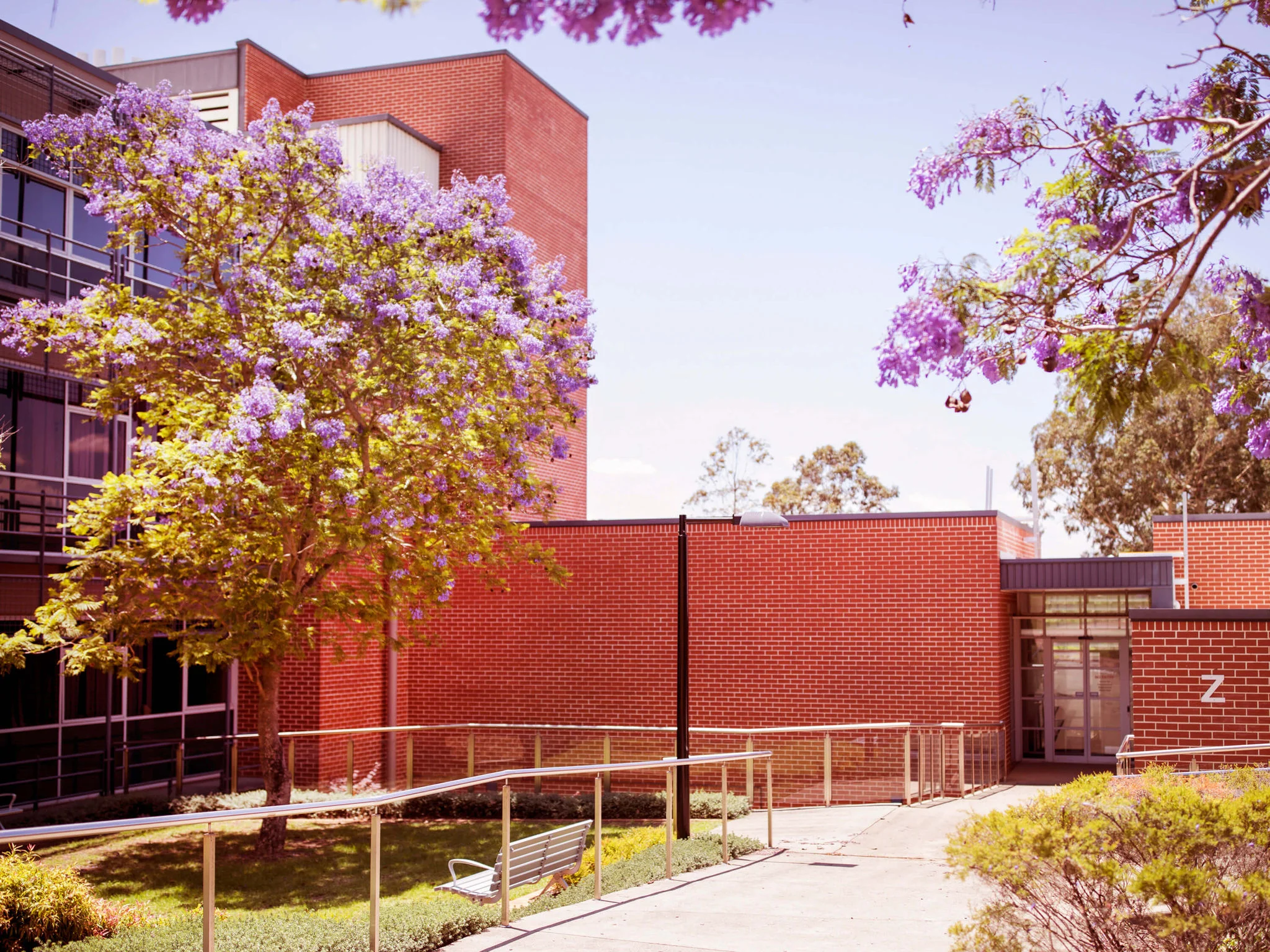In a fast-changing world, tomorrow belongs to people who are ready for anything. We’ll train you to be a critical thinker, not a narrow specialist. This degree will put you on the path to a Master of Teaching, and a rewarding career as a high school teacher. It will also give you the skills you need to explore your prospects beyond the classroom.
The smart path to teaching
As an Adobe Creative Campus, Western Sydney University gives all students complimentary access to the Adobe Creative Cloud, so you can level up your digital skills with FREE access to the Adobe Creative Cloud apps. It's like your very own innovation toolkit, where technology meets creativity!
Adobe Creative Cloud is a comprehensive suite of software tools and services which provide a one-stop platform for professionals and enthusiasts in various creative fields, offering a wide range of applications for graphic design, video editing, web development, photography, and more!
This pathway of study is accredited with the NSW Education Standards Authority.
- Huge range of majors.
- Gains skills in research and critical theory.
- Get practical, real-world experience.
Go on to your Master of Teaching (Secondary) and undertake field-day visits in a variety of high school settings.
What you can expect to study
The program structure is outlined in our handbook. Here you can view all of the subjects you will be studying.
You can choose from the following majors:
Language specialisations aim to enable students to develop an appropriate level of proficiency in a second language, which may be used for professional purposes such as teaching, interpreting and translation, business or international relations.
Students undertaking a language specialisation will be able to use the language in question according to its grammatical and pragmatic principles, communicate with native speakers appropriately in the spoken as well as the written mode, and demonstrate an understanding of the cultures and societies associated with the language.
Language majors aim to enable students to develop an appropriate level of proficiency in a second language which may be used for professional purposes such as teaching, interpreting and translation, business or international relations.
Students undertaking a language major will be able to use the language in question according to its grammatical and pragmatic principles, communicate with native speakers appropriately in the spoken as well as the written mode, and demonstrate an understanding of the cultures and societies associated with the language.
Available on Parramatta and Penrith campuses.
Geography is the integrated study of people, places and environments. In this major, you will examine the geography of contemporary Australian cities and regions. The interests of today’s geographers include post-colonialism, the emergence of global information economies, indigenous issues, class and cultural disparities, population movement, sexuality and space, and the global diffusion of popular culture.
Urban Studies is a discipline focused on social justice within the city, through its critical assessments of people’s access to scarce urban resources, such as housing, transport, education and employment.
The political, economic and cultural forces that shape cities and urban policy are the key concerns of the Urban Studies curriculum. These applied interests in urban wellbeing and city structure are the intellectual basis for the urban planning profession.
What does it mean to live in Indigenous Australia? The Indigenous Australian Studies Major offers students the exciting opportunity to acquire key cultural competencies that will enable them to understand and work more effectively with Indigenous Australians in professions.
Such as the arts, communications, media industries; education; government and non-government; policy; health; sciences; and community services.
The Indigenous Australian Studies Major addresses the cultural, historical, social and economic issues affecting Indigenous and Non-Indigenous Australians and relationships.
Language specialisations aim to enable students to develop an appropriate level of proficiency in a second language, which may be used for professional purposes such as teaching, interpreting and translation, business or international relations.
Students undertaking a language specialisation will be able to use the language in question according to its grammatical and pragmatic principles, communicate with native speakers appropriately in the spoken as well as the written mode, and demonstrate an understanding of the cultures and societies associated with the language.
Language majors aim to enable students to develop an appropriate level of proficiency in a second language which may be used for professional purposes such as teaching, interpreting and translation, business or international relations.
Students undertaking a language major will be able to use the language in question according to its grammatical and pragmatic principles, communicate with native speakers appropriately in the spoken as well as the written mode, and demonstrate an understanding of the cultures and societies associated with the language.
This major covers topics in the traditional areas of calculus and algebra. Single and multivariable calculus are covered, as well as topics in linear algebra, analysis and mathematical modelling. This major is available to all undergraduate students and may meet the NSW Institute of Teachers accreditation requirements for teaching Mathematics as a first subject in NSW state high schools.
Modern History includes the studies of societies, states and cultures since the Middle Ages and equivalent periods elsewhere. It provides important insights into the nature of the modern world, and into the origins of the features of modern life we now think of as ‘global’.
Modern History is an important teaching area for students heading into for Secondary Teaching: the purpose of this major is to group together all of the units which count as Modern History for the purposes of the Master of Teaching program and the Institute of Teaching.
Successful completion of the modern History major will count as a first teaching area for Secondary Teaching. Note that there is a wider list of history units available in the History and Political Thought major.
Career Opportunities
As a graduate of this degree, you can look forward to a broad range of exciting career opportunities in different sectors and industries. Below are some examples of the possible careers you can pursue with this degree:
- With this degree, you can go on to complete your Master of Teaching (Secondary) and become a high school teacher.
- It also opens the door to policy work, curriculum development, administration, and a host of opportunities specific to your chosen major.
Entry requirements for domestic students
Please consult the handbook for more information regarding entry requirements for this course.
You can read more about special requirements here.
Entry requirements for international students
**Please note, if this course lists a part-time option, this is not available to International Students on a Student Visa.
Please consult the handbook for more information regarding entry requirements for this course.
You can read more about international academic entry requirements here.
Indicative annual fee
A Commonwealth Supported Place (CSP) is one that is subsidised by the Commonwealth and applicable only to Domestic students. This means that the Australian Government pays part of your fees towards your program, therefore reducing your program fees, and the remaining amount is paid by you, this is considered your Student Contribution.
The fee estimates provided are indicative only and subject to change. These estimates are based on the current fee structures for a normal full time study load. However, the final fees may vary depending on several factors, including the specific subjects chosen, the duration and timing of study, and annual fee adjustments (subject to Commonwealth student contribution band rates). Please note that these estimates do not include the Student Services and Amenities Fee. We encourage all prospective and current students to consult with our Student Services Hub for the most current fee information.
As a multi-campus institution, Western Sydney University and its entities reserves the right to alter the location of its programs between campuses and other locations as necessary.
To work out how much your Student Contribution will be before you study, you will first need to find out the Student Contribution band your subjects fit into based on their general discipline area.
You can then calculate your student contributions to work out the total amount of your contribution.
The Higher Education Loan Program (HELP) is a range of loans introduced by the Australian Government from 2005 to provide fee payment assistance to eligible students. Loans are for Australian citizens studying in Australia or overseas. Permanent residents who hold a humanitarian visa are also eligible if studying in Australia.
If eligible you may be able to defer all or part of your Student Contribution through the HECS-HELP loan program. You may also be eligible for OS-HELP if undertaking studies overseas.
New Zealand citizens and holders of an Australian permanent resident visa (other than an Australian permanent humanitarian visa) are generally not entitled to HECS-HELP assistance. If you are a New Zealand citizen or permanent resident your Student Contribution amount must be paid in full by the census date.
However, the Australian Government has passed new legislation that changes the way some New Zealand citizens, who hold a Special Category Visa (SCV), studying in Australia will pay their fees. More information is available on the Changes to fees for New Zealand Citizens webpage.
Apply as a Domestic Student
If you are a domestic student, you can apply through our Western Application system which is free of charge.
Domestic students are:
- Australian Citizens
- New Zealand Citizens
- Australian permanent residents
- Australian permanent humanitarian visa holders
Scholarships
Western Sydney University recognises and rewards students who demonstrate community engagement, outstanding academic ability and superior leadership skills. Donor-funded scholarships are also available, providing support for students based on both academic achievements and equity considerations. There are also scholarships available for specific degrees.
The fee estimates provided are indicative only and subject to change. These estimates are based on the current fee structures for a normal full time study load. However, the final fees may vary depending on several factors, including the specific subjects chosen, the duration and timing of study, and annual fee adjustments (subject to Commonwealth student contribution band rates). Please note that these estimates do not include the Student Services and Amenities Fee. We encourage all prospective and current students to consult with our Student Services Hub for the most current fee information.
As a multi-campus institution, Western Sydney University and its entities reserves the right to alter the location of its programs between campuses and other locations as necessary.
Apply as an International Student
If you are an international student, you can apply for free through our international student application system or through an agent representative.
International students are:
- Not an Australian citizen;
- Not a New Zealand citizen; and
- Not a permanent resident of Australia.
If you are an international student completing the Australian HSC, IB or NCEA, apply direct via UAC International.
Admission to Western Sydney University is on the basis of meeting minimum academic and English language requirements. For more information about tuition fees and other costs, visit the Fees and Costs page.
Scholarships
When you apply to Western, you’re automatically assessed for a Scholarship, no additional application required! We’re offering multi-year scholarships (for up to 3 years) valued at $6,000 or $3,000 and even 50% off tuition fees. Scholarships are awarded on academic merit.
Want to know more?
We're here to provide clarity.
If you're uncertain about your study journey, enquire about our program today and gain the confidence to move forward.
Australian students
1300 668 370
International students
+61 2 9852 5499

The fee estimates provided are indicative only and subject to change. These estimates are based on the current fee structures for a normal full time study load. However, the final fees may vary depending on several factors, including the specific subjects chosen, the duration and timing of study, and annual fee adjustments (subject to Commonwealth student contribution band rates). Please note that these estimates do not include the Student Services and Amenities Fee. We encourage all prospective and current students to consult with our Student Services Hub for the most current fee information.
As a multi-campus institution, Western Sydney University and its entities reserves the right to alter the location of its programs between campuses and other locations as necessary.






